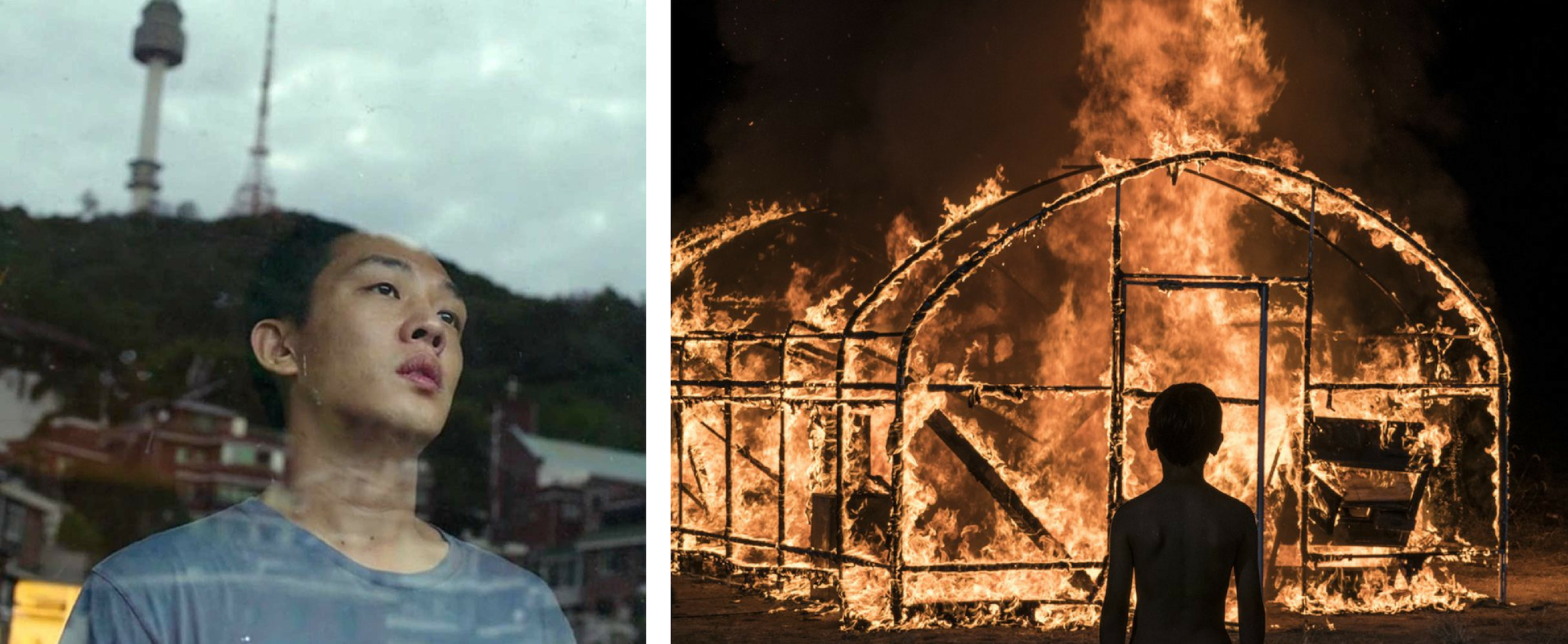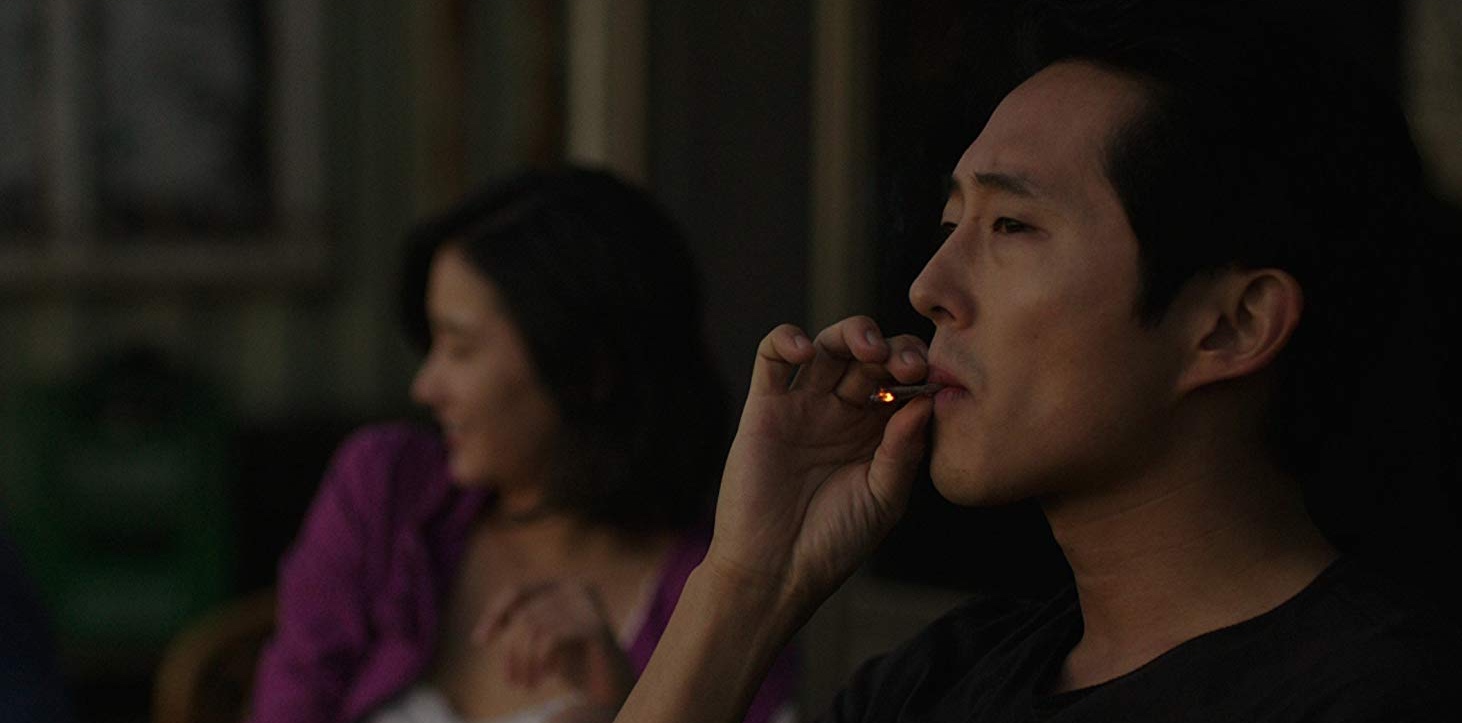“Burning” (2018) by Chang-Dong Lee
It’s been 4 days since I watched “Burning”, by Chang-Dong Lee, but the images from the film are still seared onto my brain. I don’t normally like to leave such a long gap between watching a film and writing about it, but the hazy quality time places over memory somehow seems to match this film perfectly. Remembering every detail of the film feels like arguing against it’s own existence, because everything is up for question and remembering every detail won’t help you get any closer to the truth. Watching it feels like the end of a long wasted day alone on a deserted island with only an anxious mind for company, staring at a purple and blue horizon well after the sun has gone down with an unquenchable yearning in your heart. If you find the abstract, ambiguous way I am compelled to write about this movie pretentious or annoying, “Burning” is probably not the movie for you. For everyone else, I highly recommend you let it’s warm waves wash over you.
There is a story, of course, a mysterious love triangle between 3 young adults who barely know each other. Except that it is not a romantic or erotic film, and while there is a mystery, the film isn’t particularly interested in solving it, only exploring it. And frankly, it’s not entirely clear what is the intention or motivation of any member of the triangle in question. So, you may be asking, what the hell is the point of this film? I think it’s really about the loneliness of the modern age, the aimless nature of a generation with fewer job opportunities, inauthenticity shaped by a social media culture, and an inability to truly connect with other people. That may sound like it’s a film looking down on the younger generations, but it is actually one of great empathy for a youth culture constantly misunderstood and misrepresented in media. The way these characters behave is shaped by the world they live in, our world. They are underemployed and drifting, seeking for meaning, seeking for connection, all without a clue how to go about it. No one taught them how to cope in this world, because everyone from the older generations lived their youth in a completely different world, and they are blind to the difference.
Jongsu, Hae-min, and Ben
This is a good moment to pause and acknowledge something important about generational gaps. Every new generation rebels against the older generations, and the older generations tend to have trouble understanding the new generation, which can lead to looking down on them. However, what is happening in the modern age that is different than the past is that the rate of change (of technology, society, scientific discovery) has accelerated so rapidly that we have crossed a threshold where the world is fundamentally, rather than incrementally, different than it was one or two generations ago. In my lifetime we have shifted from no internet and almost no global awareness outside of our own country, to ubiquitous internet and constant awareness and connection to every corner of the world. I think we do not acknowledge and talk about the impact of that change enough, and how much more complex and challenging the world has become to navigate practically, mentally, and emotionally. Throw on top of that things like the opioid crisis, looming automation takeover, climate change, and many other dire issues that are hanging over the younger generations, and the argument that they are just lazy or weak or narcissistic sounds absurd. They are desperately trying to cope with an information overload that gives them a bleaker outlook than previous generations. The media and governments could control information much more easily in the past, so what people had to take in, process, and deal with was comically small compared to today. It has gotten to a point where I don’t think we fully understand the emotional and mental burden of the modern world on the human brain, and the youth of today are growing up knowing nothing but that world.
Getting back to “Burning” and loneliness, the most interesting thing about our main character Jongsu is the way he allows himself to be drawn into more and more awkward social situations out of a combination of politeness and loneliness. He runs into a girl from his hometown in the city, but he doesn’t recognize her because, as she says, she had significant plastic surgery. He falls for her because she’s pretty and she shows a desire for his attention and affection. Jongsu presents as incredibly aloof, he does not know how to flirt or express affection, but the moment a girl he barely remembers flirts with him he falls in love because his longing for connection is so overwhelming. Soon Ben enters the picture out of nowhere, cool and confident and rich, and he is always with Hae-min. Jongsu is left feeling confused and hurt because he senses he has lost Hae-min romantically, but he never expresses his feelings, and instead just hangs around with Ben and Hae-min trying to understand them; what is their relationship to each other, and what is his relationship to each of them. They form an instant constellation, as if seen from Earth, where it is impossible to tell how close or far apart the stars really are or what is the true nature of their relationship to one another. Three ambiguous lives sharing ambiguous space for an ambiguous amount of time.
There is a core mystery that arises, but as the movie isn’t particularly interested in solving it, neither am I. Instead, I am fascinated by the way the movie combines the aesthetics and style of a mystery/thriller with those of an arthouse film, and uses that combination to create a mood which transmits the existential angst of our main characters. We don’t need to know all the details of what happens to feel what the characters feel, to be lost in a world of vast natural beauty and splendor yet feel trapped and suffocated by it. There are a few scenes in the film where characters are chasing fleeting moments of illumination, literally, moments of passing or fading sunlight or flames, mirroring their futile efforts to hold onto any meaning or substance in their lives. Hae-min dances topless in the dusk after sunset by the countryside with her arms outstretched towards the heavens trying to satisfy her ‘Great Hunger’ for knowledge of the universe. Jongsu dreams of standing as a boy in front of a burning greenhouse, the flames violent and vivid against the black country night. Everything for them feels so big and unattainable, even when it’s right in front of them.
Steven Yeun as Ben
Ben represents for Jongsu and Hae-min everything they think they are searching for, but everything about Ben is unreal, illusory. They chase Ben’s manufactured life the way so many young people chase the manufactured lives they see on Instagram, and it just leaves everyone feeling sad and inadequate. How do young people deal with life when they are made to constantly feel like they are not enough? Rather than comparing to the past, can we acknowledge the rapidly changing world and the challenges it presents? Because that is the future, constant change. The young people of today are pioneers and explorers, figuring out how to cope in an ever shifting social and technological landscape for the benefit of future generations who, let’s be honest, they probably won’t understand! Sorry, after all that searching, I thought it would be fun to end on a joke.



